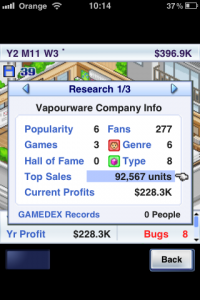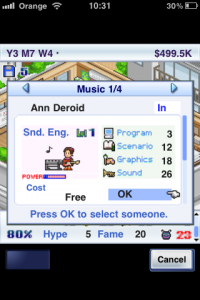
Released on Apple devices, Gamedev Story is one of the most meta games you’ll ever play. You’re playing a game where you run a studio that makes games. The thing is, this whole game was created by a fledgling studio called Kairosoft who must have been struggling just like the little on screen avatars they were creating. In order to increase the confusion, I chose to delve a whole level deeper and call the first game I created “Gamedev Story”. In my mind it’s a sim game where you run a fledgling game studio. Hopefully when we feel the car fall we’ll wake up in the real world…
In GameDev Story (the real one), you work as the head of a fledgling game studio. In typical Sim or Tycoon style, you name your company, hire and fire staff, level up team members and generally make more important business decisions each minute than a whole team of clueless apprentices on a bad reality TV show.

The look is charming and basic. The presentation has a “Gameboy advance” feel to it and you feel like working in your little virtual office is the job the little on-screen people have taken up when they grow too old to catch and breed Pokemon.
The scope of the game is surprisingly large. A range of events punctuate the day to day coding of the little employees. In between watching the stats for gameplay and graphics slowly rise in time with the busy keyboard-hammering fingers, you’re called away to press conferences to hear of new console releases. Negotiating licenses, setting up booths for game expos, advertising, lamenting game review scores; all these events and more will take place over the course of a few minutes of game time and every moment is compelling. The constant efforts to balance income from your previous release with training staff, paying for licenses and research and all the while trying to satisfy your fanbase is engaging, but you also feel that the developers would love to see you struggle and squirm, laughing at each compromise you make in quality or length. “Not so easy is it”, they might mock. “Now you see how hard it is to keep you fans happy!”

For such a low price ($4 or £2.40) there’s a huge amount of game. It’s still light in some areas though; every moment you play you think of something extra they could include in the sequel. Despite that, it’s a staggering accomplishment that they have taken the one boring part of games (the part where all you see are lines of code and social rejects hammering on keyboards) and made a great game out of it. Before a big release like Call of Duty or Halo is available to be experienced in our living rooms on huge televisions and surround sound systems, they are meticulously pieced together by sleep deprived nerds in anaemic offices strung out on Red Bull.

If ever a developer has shown that you can make a game about ANYTHING, then it’s Kairosoft. It might have to use the names Senga and Intendo, but other than that you get the feeling that the game is scarily close to real game development, no matter what the devs themselves may say.
If you can make a game about cooking without having anything to eat at the end, and a game about relationships where you don’t get a real hug, can you have a game about development without having a game to play at the end? The answer, apparently, is yes.
9 spinning tops out of 10
